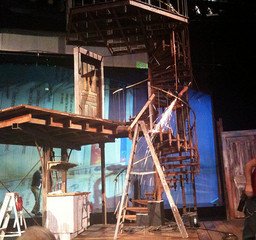 Whether writing for your own theatre group or creating a play with aspirations of seeing it turned into a major production, playwriting requires patience, dedication, and practice. The moment you see your script come alive on stage, however, it will all be worth it. While attending musical theatre classes can give you far more in-depth knowledge, here are some tips to keep in mind when writing your first play.
Whether writing for your own theatre group or creating a play with aspirations of seeing it turned into a major production, playwriting requires patience, dedication, and practice. The moment you see your script come alive on stage, however, it will all be worth it. While attending musical theatre classes can give you far more in-depth knowledge, here are some tips to keep in mind when writing your first play.
Watch – And Read – As Many Plays as Possible
Just as aspiring film screenwriters are encouraged to read screenplays and watch movies with a more critical eye, aspiring playwrights can benefit immensely from spending time reading scripts and attending as many plays as possible. Don’t limit yourself to a particular genre or a certain type of theatre; attend and study everything from Broadway musicals to community theatre comedies to college or even high school dramatic productions. Even if the genre isn’t one you think you want to write, the more exposure you can get, the better – plus, you never know when a particular element or idea might inspire you.
Consider Logistics
Though talented and skilled theatre technicians can pull off some impressive feats, keep in mind that live performance inherently contain some restrictions that film productions may not have. When writing your play, keep in mind the logistics that go into special effects, set changes, makeup and wardrobe changes, and other elements that take significant time and effort; even with the most talented make-up artists available, a complete physical transformation may require far more time than the few minutes available between a character’s scenes. If possible, spend time behind the scenes at various productions, either as an observer or preferably as a volunteer, so that you can have a better grasp of what each behind-the-scenes role in theatre requires, is capable of, and is constrained by. This information can help you write a play with elements that are reasonable to perform.
Ask for Input
For novice playwrights, asking for help or advice can be invaluable. Even experienced playwrights know that input and feedback from others can help improve the writing process. This may be as inclusive as asking others to collaborate with you on certain elements that you don’t have much experience with yet – such as help writing lyrics in musicals, or assistance with certain types of scenes – or as simple as asking actors to read your lines and provide feedback as you go.
Focus on a Single Story
The very nature of a live theatre performance can make it difficult to portray off-stage events, or to continually flip between very different settings and storylines. While more experienced playwrights may be able to weave multiple storylines together in a way that works for live theatre, as a new playwright you will likely be far better off sticking with a single story for your first few plays. This will allow you to fully flesh-out and perfect the main storyline and characters without having to juggle the difficult and advanced skills required to add more.
Still Have More Questions?
KD Conservatory has acting, musical theatre, and film production programs to help prepare students for careers in the entertainment industry. Contact us with any of your questions, or check us out on Facebook for ongoing updates and information!















